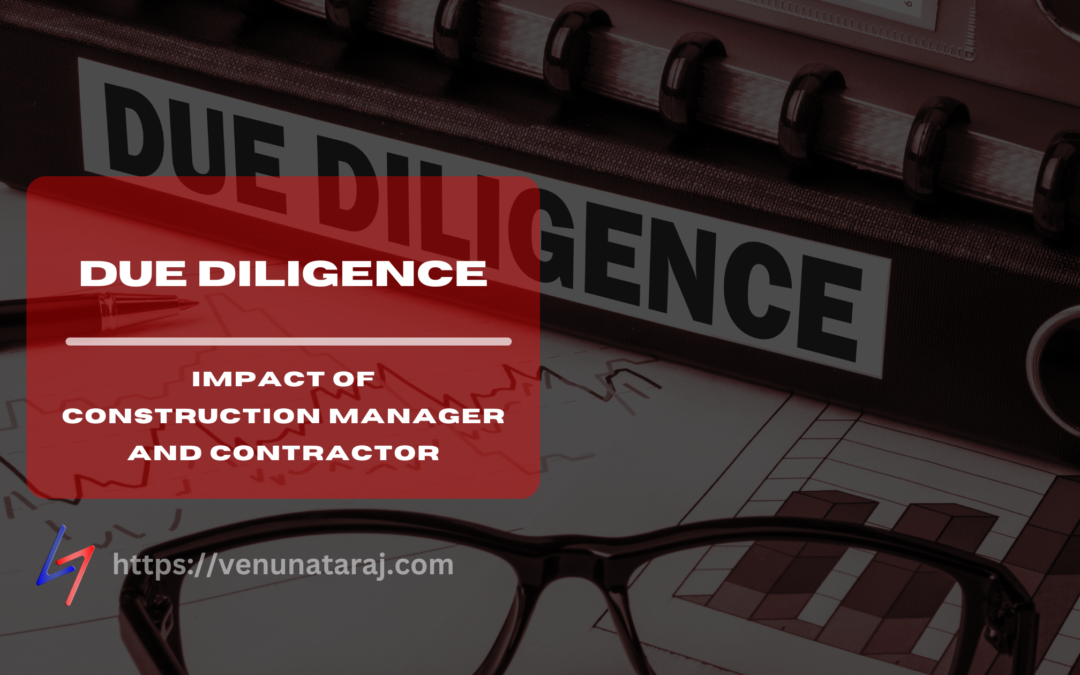Table of Contents
When it comes to construction projects, there’s a crucial step that often happens behind the scenes but plays a huge role in a project’s success. It’s called due diligence, and it’s something both construction managers and contractors need to understand. Let’s break down what due diligence means in construction and why it’s so important for everyone involved.
What is Due Diligence in Construction?
Think of due diligence as doing your homework before jumping into a big project. It’s all about taking a close look at every aspect of a construction project before it starts. This means checking out potential risks, making sure everything follows the rules, and confirming that everyone involved can do their part.
In simple terms, due diligence in construction is a detailed investigation and risk assessment that happens before a project kicks off. It’s like a safety net that helps catch any issues early on, saving time, money, and headaches down the road.
Why is Due Diligence So Important?
- It Helps Avoid Surprises: By looking into everything beforehand, you’re less likely to run into unexpected problems once construction starts.
- It Keeps Things Legal: Due diligence makes sure the project follows all the necessary laws and regulations.
- It Protects Everyone Involved: From the project owner to the workers on site, due diligence helps ensure everyone’s interests are protected.
- It Can Save Money: Catching potential issues early can prevent costly mistakes or delays later on.
How Due Diligence Impacts Construction Managers and Contractors
Now, let’s look at how due diligence affects the roles of construction managers and contractors. It’s important to understand that while they have different jobs, due diligence is crucial for both.
For Construction Managers:
1. Ensuring Project Feasibility:
- Construction managers use due diligence to make sure the project is actually doable. They look at things like:
- Is the budget realistic?
- Can the project be completed in the given timeframe?
- Are there any environmental concerns with the site?
2. Risk Management:
- They identify potential risks early on. This might include:
- Weather-related delays
- Possible material shortages
- Labor issues
3. Compliance Checks:
- Construction managers make sure the project follows all necessary regulations. This involves:
- Checking zoning laws
- Ensuring all required permits are in place
- Verifying that the design meets building codes
4. Stakeholder Communication:
- They use the information gathered during due diligence to keep everyone in the loop, including:
- Project owners
- Investors
- Contractors and subcontractors
For Contractors:
1. Preparing Accurate Bids:
- Due diligence helps contractors create more accurate bids by:
- Understanding the full scope of the project
- Identifying potential challenges that might affect costs
2. Resource Planning:
- Contractors use due diligence findings to plan their resources better, including:
- How many workers they’ll need
- What equipment will be required
- Which materials to order and when
3. Safety Planning:
- By understanding the project thoroughly, contractors can:
- Develop comprehensive safety plans
- Identify and prepare for potential hazards
4. Subcontractor Selection:
- Due diligence information helps contractors choose the right subcontractors by:
- Understanding which specialized skills are needed
- Ensuring subcontractors are qualified for specific tasks
The Due Diligence Process: A Team Effort
While construction managers often lead the due diligence process, it’s really a team effort. Here’s how it typically works:
1. Gathering Information:
- Construction managers collect data about the project, site, and potential risks.
- Contractors contribute their expertise on construction methods and potential challenges.
2. Analysis:
- The team reviews all the information, looking for red flags or areas that need more attention.
3. Risk Assessment:
- Together, they identify potential risks and brainstorm ways to manage them.
4. Compliance Check:
- They ensure all aspects of the project meet legal and regulatory requirements.
5. Reporting:
- The findings are compiled into a comprehensive report that guides project planning and execution.
Real-World Impact: How Due Diligence Makes a Difference
Let’s look at a quick example to see how due diligence can play out in a real project:
Imagine a new office building project. During the due diligence process, the construction manager discovers that the soil at the site is unstable. This information allows the team to:
- Adjust the foundation design to account for the soil conditions.
- Update the budget to include the cost of soil stabilization.
- Modify the project timeline to allow for additional site preparation work.
- Choose contractors with experience in similar soil conditions.
Without this due diligence, the project could have faced significant delays, cost overruns, or even structural issues down the line.
Wrapping Up: The Power of Being Prepared
In the world of construction, knowledge really is power. Due diligence gives construction managers and contractors the information they need to tackle projects with confidence. It’s not just about ticking boxes or following rules – it’s about setting up every project for success from day one.
By taking the time to do thorough due diligence, construction professionals can:
- Build safer structures
- Complete projects more efficiently
- Avoid costly mistakes and delays
- Deliver better results for clients
So, the next time you hear about a construction project getting underway, remember that behind the scenes, a lot of careful planning and investigation has likely taken place. That’s the power of due diligence in action, helping to create the buildings and infrastructure we rely on every day.
Related Articles:
Roles and Responsibilities of a Construction Manager

